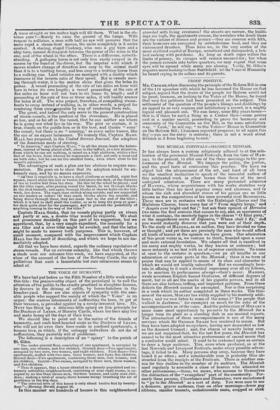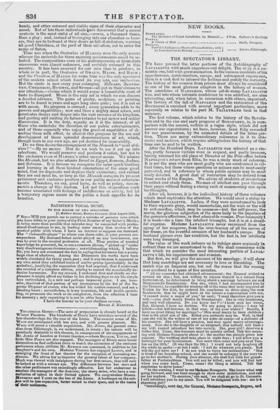THE MUSICAL FESTIVALS—HANDEL'S MESSIAH.
IT has always been a custom religiously adhered to at the cere- bration of the provincial Musical Festivals, from the time of HAN-. DEL to the present, to allot one of the three mornings to the per- formance of the Messiah. We impugn the policy, the justice, and the good taste of continuing this practice. We have no object but the advancement of the art, and least of all have we the smallest inclination to speak of the immortal author of this celebrated work in other terms than those of the most unfeigned admiration. There are many pretended admirers of HANDEL, whose acquaintance with his works stretches very little farther than his most popular songs and choruses, and to whom the rich and abundant stores of his genius are as little known as the compositions of his once powerful rival BONONCINI. These men are in ecstacies with the Hallelujah Chorus and the Hailstone Chorus, know every bar of " From mighty kings," and " Angels ever bright and fair ;" but ask their opinion of Hercules (we mine the first oratorio that occurs to us), and, as specimens of what it contains, the masterly fugue in the chorus " 0 filial piety," or the magnificent scena of Ddanira," Where shall I fly," and you would instantly discover that you were out of their depth. To the study of HANDEL, as an author, they have devoted no time or thought ; and yet these are precisely the men who would affect all kinds of horror at the opinion we have given. Our admiration of this great writer is, we venture to think, founded upon a surer and more rational foundation. We admire all that is excellent in his many and mighty works, be they known or unknown ; but mere notoriety is no test with us of superior excellence. To come at once to the oratorio in question,--we go all lengths in our admiration of certain parts of the Messiah;- there is no term of praise that can be applied to -music of its class and character to which we would not readily subscribe. But we exceedingly hesi- tate in affixing to it such a decided supremacy over all its fellows, as to sanction its performance always—theirs never. HANDEL wrote seventeen English Sacred Oratorios, of different degrees of merit, but in all are the marks of his gigantic powers, and in all there are also tedious, trifling, and imperfect portions. From these defects the Messiah cannot be exempted. Nor is this surprising in a work which its author completed in three weeks. The thin- ness of the score, MOZART has richly supplied by his masterly addi- tions ; and we now listen to some of the songs (" The people that walked in darkness," for example) as much for the sake of the accompaniments as of the voice. And the publication of MOZART S score came most opportunely to preserve to the Messiah for a longer term its place as a standing dish in our musical repasts. The introduction of these accompaniments is one of the many services which Sir GEORGE SMART has rendered to music. But they have been adopted everywhere, having now descended as low as the Ancient Concert; and, the charm of novelty being over, we are not surprised that, for the last few years, the Messiah has ceased to be the most attractive performance of sacred music that a conductor could select. It used to he reckoned upon as certain to draw a large audience. This. even when produced, as at the last Norwich and Liverpool Festivals, under every possible advan- tage, it failed to do. Many persons stay away, because they have heard it so often ; and a considerable sum is probably thus ab- stracted from the receipts of the Festivals. 'There is another rea- son for this decline in the number of its auditors. The Messiah used regularly to assemble a class of hearers who attended no other performance,—those, we mean, who assume to themselves the distinction of the "evangelical" part of the community. For- merly these persons, Churchmen and Dissenters, were accustomed to "go to the Messiah" as a sort of duty. You were sure to see a demurer, graver audience, than on other mornings—fewer gay ribbons, smaller bonnets, unfashionable coats, cropped or sleek heads, and other outward and visible signs of their character and creed. But of late these individuals tlave discovered that a sacred oratorio is the most sinful of all sins,—worse, a thousand times, than a play ; and, instead of thronging into our churches as hear- ers, they are to be found at their doors as bill-distributors, warning all good Christians, at the peril of their salvation, not to enter the camp of Satan. Time was when the Oratorios of HANDEL were the only source whence the materials for three morning performances could be se- lected. The compositions even of his contemporaries or immediate successors were almost unknown, and certainly unheard in this country. It has been reserved for our own time to produce, in whole or in part, the Oratorios of GRAUN, HASSE, and l3acii ; and the Creation of HAYDN for some time was the only specimen of the modern school which found its way into our orchestras. But the circle is now every year enlarging. MOZART,.BEETFIO- van, CHERUBINI, Hummel., and Spoua—all put in their' claims to our attention,—claims which it would argue a lamentable want of taste to disregard. Music is the only art in which we can discern a decided advance. The gems of poetry, sculpture, or painting are to be found in years and ages long since gone ; but it is not so with music. Its progress is onward ; every generation adds to its powers and capabilities ; now and then a mighty mind arises, and penetrates deeper and deeper into the vast recesses of its kingdom, and guiding and inciting its future votaries to yet newer and nobler discoveries. It is the duty, equally as it is the interest, of all those who undertake the direction of our public entertainments, and of those especially who enjoy the greatest capabilities of di- recting them with effect, to cherish this progress by the use and development of those splendid demonstrations of art, which, though born in our own age, are yet destined for immortality. Do we then desire the consignment of the Messiah to " cold obli- vion? "—By no means. Nor do we wish to see it cut up into selections. We would preserve and perform it entire, but not to the exclusion even of HANDEL'S other sacred music. We admire the Messiah, but we also admire Israel in Egypt, Samson, Joshua, and Solomon. It is because we recognize the same spark kindling and burning in all these kindred emanations of the same great mind, that we deprecate and deplore their extinction; and extinct they are and must be, so long as the Messiah occupies its present prominent and exclusive position in our public musical entertain- ments. Therefore, we say, good taste, as well as policy, recom- mends a change of this custom. Let not this stupendous work become associated with feelings of indifference or satiety, but let a temporary repose create in the public a fresh appetite for its beauties.



























 Previous page
Previous page